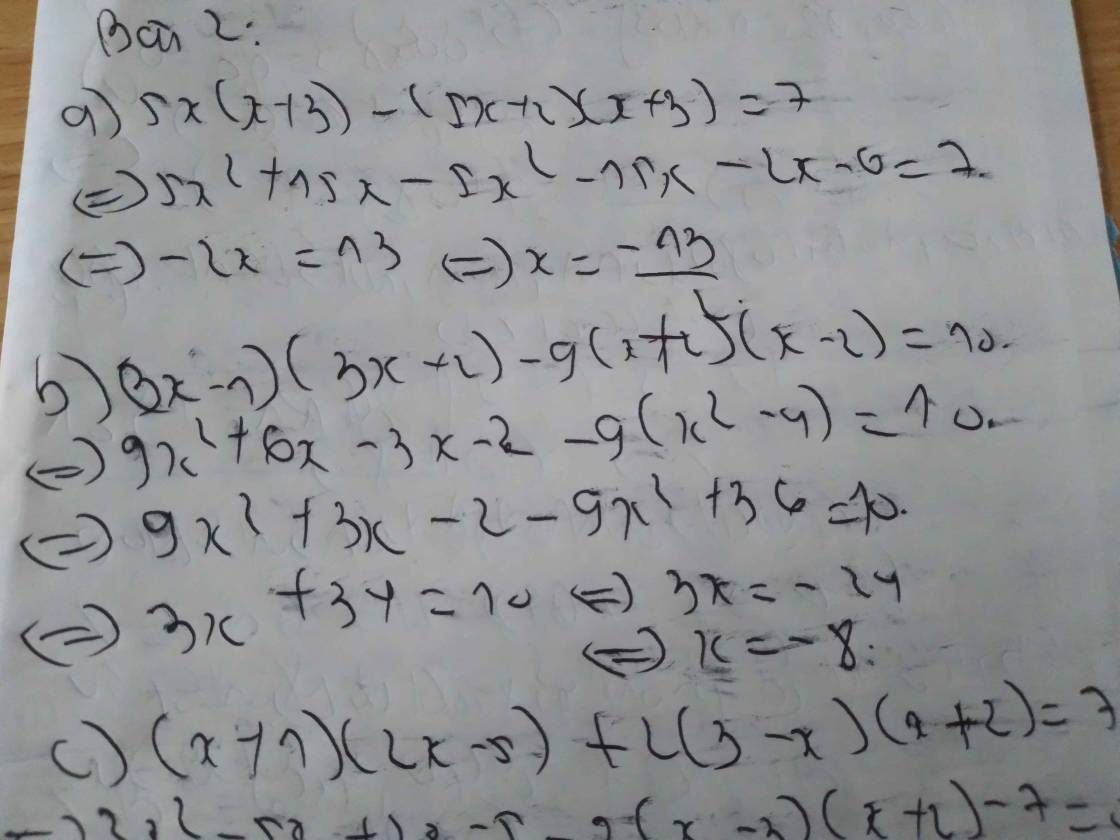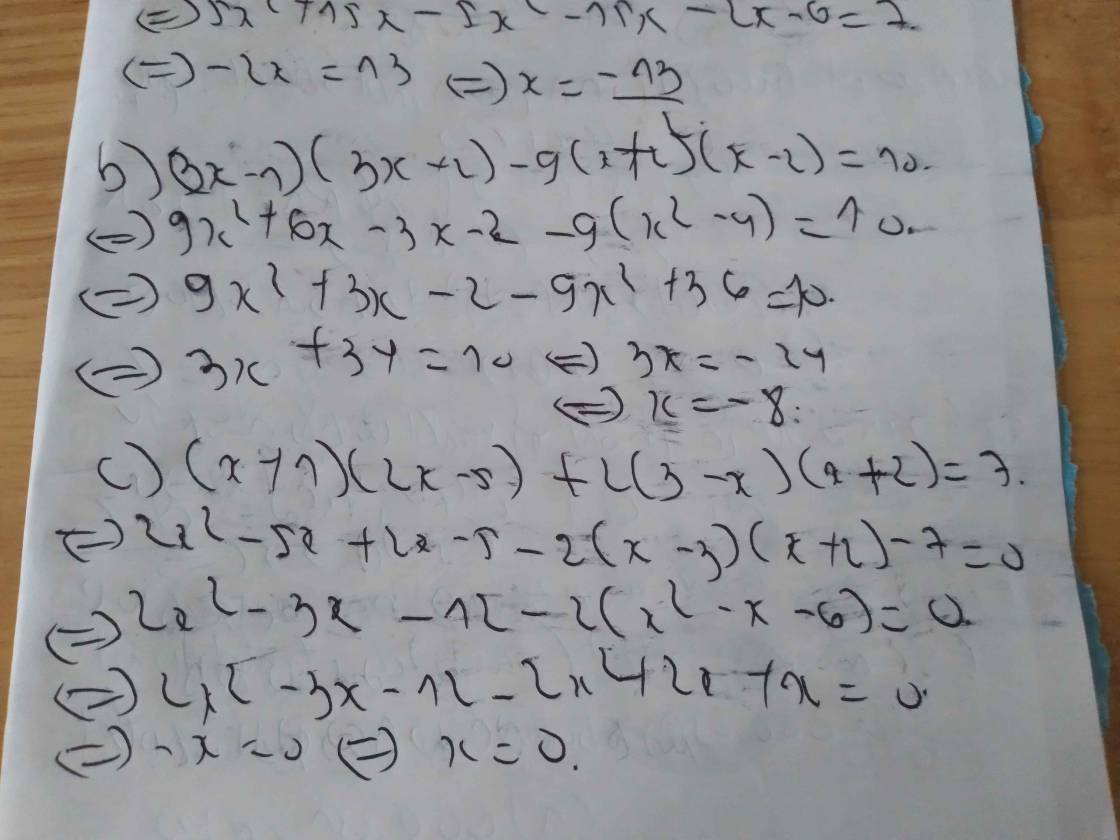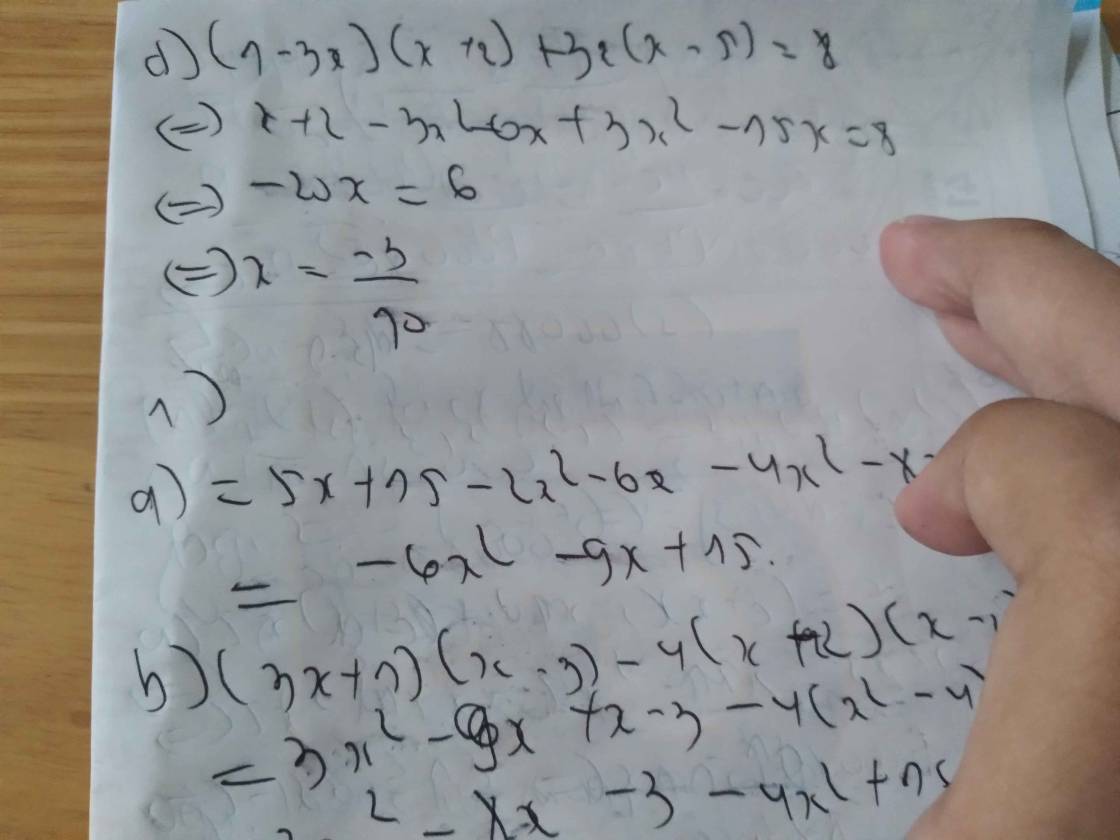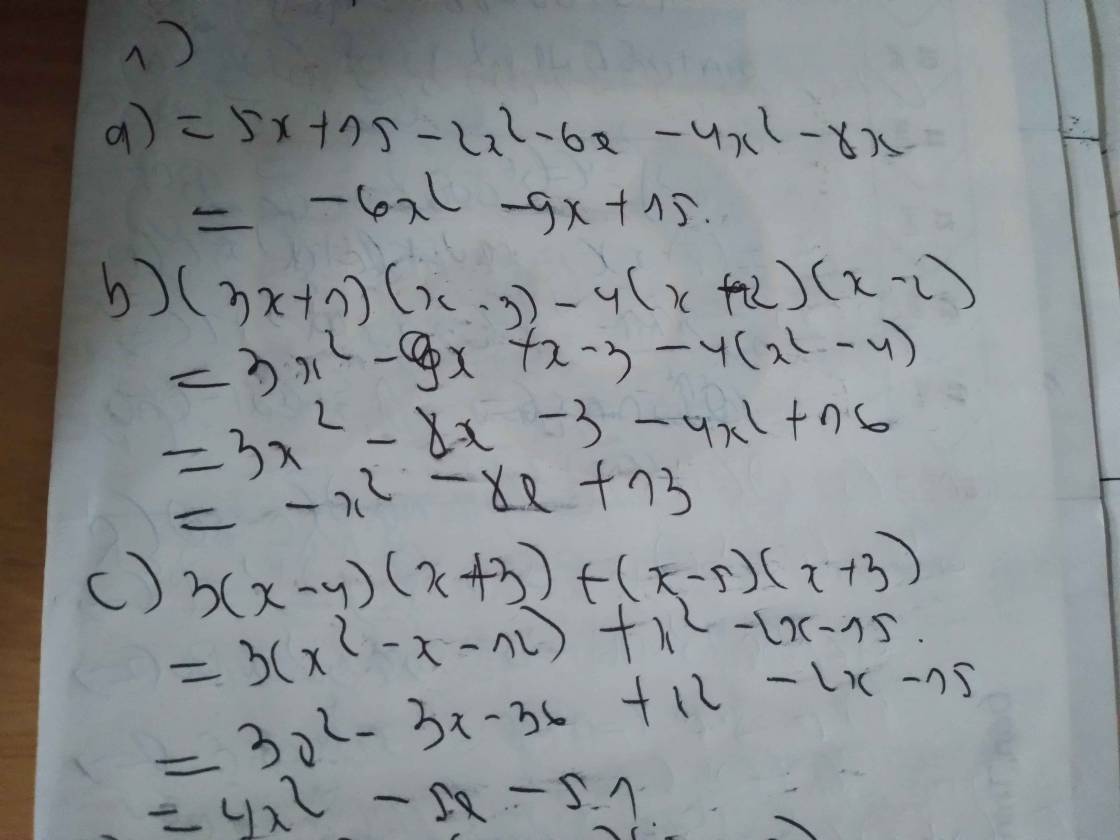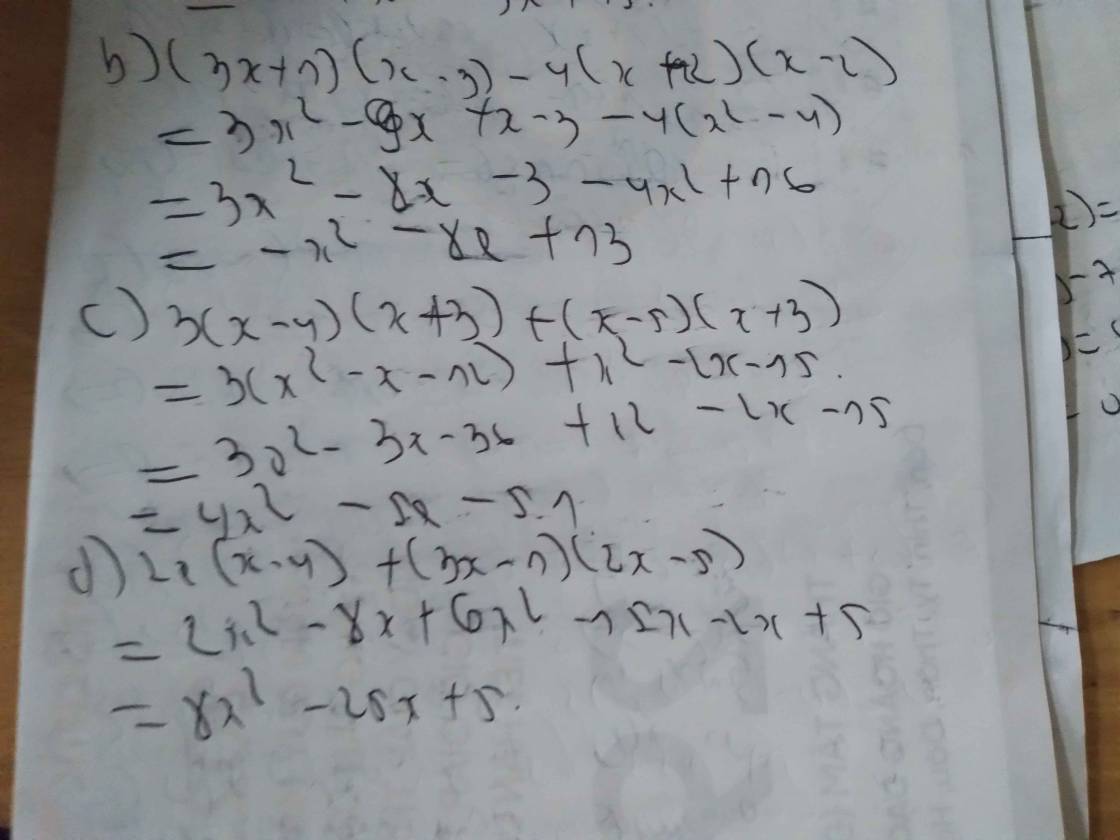Hãy nhập câu hỏi của bạn vào đây, nếu là tài khoản VIP, bạn sẽ được ưu tiên trả lời.

1: Ta có: \(\left(x+3\right)^2-\left(x+2\right)\left(x-2\right)=4x+17\)
\(\Leftrightarrow x^2+6x+9-x^2+4-4x=17\)
\(\Leftrightarrow x=2\)
3: Ta có: \(\left(2x+3\right)\left(x-1\right)+\left(2x-3\right)\left(1-x\right)=0\)
\(\Leftrightarrow2x^2-2x+3x-3+2x-2x^2-3+3x=0\)
\(\Leftrightarrow6x=6\)
hay x=1

1)
\(4x^2-4x+1-4x^2-16x-16=9\)
\(-20x-15=9\)
-20x=24
x=-1,2
3)
(2x+1)2=52
2x+1=5
2x=4
x=2
\(1,\Rightarrow4x^2-4x+1-4x^2-16x-16=9\\ \Rightarrow-20x=23\Rightarrow x=-\dfrac{23}{20}\\ 2,\Rightarrow9x^2-6x+1+2x+6+11-11x^2=15\\ \Rightarrow2x^2+4x-3=0\\ \Rightarrow2\left(x^2+2x+1\right)-5=0\\ \Rightarrow2\left(x+1\right)^2-5=0\\ \Rightarrow\left[\sqrt{2}\left(x+1\right)-\sqrt{5}\right]\left[\sqrt{2}\left(x+1\right)+\sqrt{5}\right]=0\\ \Rightarrow\left[{}\begin{matrix}\sqrt{2}\left(x+1\right)=\sqrt{5}\\\sqrt{2}\left(x+1\right)=-\sqrt{5}\end{matrix}\right.\\ \Rightarrow\left[{}\begin{matrix}x+1=\sqrt{\dfrac{5}{2}}=\dfrac{\sqrt{10}}{2}\\x+1=-\sqrt{\dfrac{5}{2}}=\dfrac{-\sqrt{10}}{2}\end{matrix}\right.\\ \Rightarrow\left[{}\begin{matrix}x=\dfrac{\sqrt{10}-2}{2}\\x=\dfrac{-\sqrt{10}-2}{2}\end{matrix}\right.\)
\(3,\Rightarrow\left(2x+1\right)^2-25=0\Rightarrow\left(2x+1-5\right)\left(2x+1+5\right)=0\\ \Rightarrow\left[{}\begin{matrix}2x=4\\2x=-6\end{matrix}\right.\Rightarrow\left[{}\begin{matrix}x=2\\x=-3\end{matrix}\right.\)
\(4,\Rightarrow x^3+3x^2+3x+1-x^3-2x^2-2x+1-x^2=15\\ \Rightarrow x+2=15\Rightarrow x=13\)

(x+2)(x+3)-(x-2)(x+5)=0
=> x2+5x+6-x2-3x+10=0
=>2x+16=0
=>2x=-16
=>x=-8

Tìm x, biết:
1) 2x ( x - 5) - x ( 2x - 4 ) = 15
<=> 2x2 - 10x - 2x2 + 4x - 15 = 0
<=> -6x - 15 = 0
<=> -6x = 15
<=> x = -15/6
2) ( x +1)( x + 2 ) - ( x + 4 ) ( x + 3 ) = 6
<=> x2 + 2x + x + 2 - x2 - 3x - 4x - 12 - 6 = 0
<=> -4x = -16
<=> x = 4
3) 4x2 - 4x + 5 - x ( 4x - 3) = 1 - 2x
<=> 4x2 - 4x + 5 - 4x2 + 3x - 1 + 2x = 0
<=> x + 4 = 0
<=> x = -4
4) ( x + 3 ) ( 2x + 1 ) - 2x2 = 4x - 5
<=> 2x2 + x + 6x + 3 - 2x2 - 4x + 5 = 0
<=> 3x + 8 = 0
<=> 3x = -8
<=> x = -8/3
5) -4 ( 2x - 8 ) + ( 2x - 1 )( 4x + 3 ) = 0
<=> - 8x + 32 + 8x2 + 6x - 4x - 3 = 0
.......
6) -3 . (x-2) + 4 . (2x-6) - 7 . (x-9)= 5 . (3-2)
<=> -3x + 6 + 8x - 24 - 7x + 63 - 5 = 0
<=> -2x + 40 = 0
<=> -2x = -40
<=> x = 20
Còn lại tương tự ....

a)\(\left(x-2\right)^2-\left(x-3\right)\left(x+3\right)=6.\)
\(\Leftrightarrow x^2-4x+4-x^2+9-6=0\)
\(\Leftrightarrow-4x+7=0\)
\(\Leftrightarrow4x=7\Leftrightarrow x=1,75\)
\(b,4\left(x-3\right)^2-\left(2x-1\right)\left(2x+1\right)=10.\)
\(\Leftrightarrow4\left(x^2-6x+9\right)-4x^2+1-10=0\)
\(\Leftrightarrow-24x+27=0\)
\(\Leftrightarrow24x=27\Leftrightarrow x=1,125\)

a ) \(\left(x-2\right)^2-\left(x-3\right)\left(x+3\right)=6\)
\(\Leftrightarrow x^2-4x+4-x^2+9=6\)
\(\Leftrightarrow-4x+13=6\)
\(\Leftrightarrow-4x=-7\)
\(\Leftrightarrow x=\frac{7}{4}\)
Vậy \(x=1\).
b ) \(4\left(x-3\right)^2-\left(2x-1\right)\left(2x+1\right)=10\)
\(\Leftrightarrow4\left(x^2-6x+9\right)-\left(4x^2-1\right)=10\)
\(\Leftrightarrow4x^2-24x+36-4x^2+1=10\)
\(\Leftrightarrow-24x+37=10\)
\(\Leftrightarrow-24x=27\)
\(\Leftrightarrow x=\frac{9}{8}.\)
Mấy pài kia tương tự . :D

a, (x-2)^2 - (x-3)(x+3)=6
x^2-4x+4-(x^2-9)=6
x^2-4x+4-x^2+9=6
(x^2-x^2)-4x+13=6
-4x=-7
x=1,75
b, 4(x-3)^2 - (2x-1)(2x+1)=10
4(x^2-6x+9)-(4x^2-1)=10
4x^2-24x+36-4x^2+1=10
-24x+37=10
x=9/8
c,(x-4)^2 - (x+2)(x-2)=6
x^2-8x+16-(x^2-4)=6
x^2-8x+16-x^2+4=6
-8x+20=6
x=7/4
d, 9(x+1)^2 - (3x-2)(3x+2)=10
9(x^2+2x+1)-(9x^2-4)=10
9x^2+18x+9-9x^2+4=10
18x+13=10
x=-1/6
\(a,\left(x-2\right)^2-\left(x-3\right)\left(x+3\right)=6\)
\(\left(x-2\right)^2-\left(x-3\right)\left(x+3\right)=6\)
\(-4x+13=6\)
\(-4x=6-13\)
\(-4x=-7\)
\(x=\frac{-7}{-4}\)
\(x=\frac{7}{4}\)
Vậy \(x=\frac{7}{4}\)
\(b,4\left(x-3\right)^2-\left(2x-1\right)\left(2x+1\right)=10\)
\(4\left(x^2-6x+9\right)-\left(4x^2-1\right)=10\)
\(4x^2-24x+36-4x^2+1=10\)
\(-24x+37=10\)
\(x=\frac{9}{8}\)
Vậy \(x=\frac{9}{8}\)
\(c,\left(x-4\right)^2-\left(x+2\right)\left(x-2\right)=6\)
\(x^2-8x+16-\left(x^2-4\right)=6\)
\(x^2-8x+16-x^2+4=6\)
\(-8x+20=6\)
\(x=\frac{7}{4}\)
Vậy \(x=\frac{7}{4}\)
\(d,9\left(x+1\right)^2-\left(3x-2\right)\left(3x+2\right)=10\)
\(9\left(x^2+2x+1\right)-\left(9x^2-4\right)=10\)
\(9x^2+18x+9-9x^2+4=10\)
\(18x+13=10\)
\(x=\frac{-1}{6}\)
Vậy \(x=\frac{-1}{6}\)
